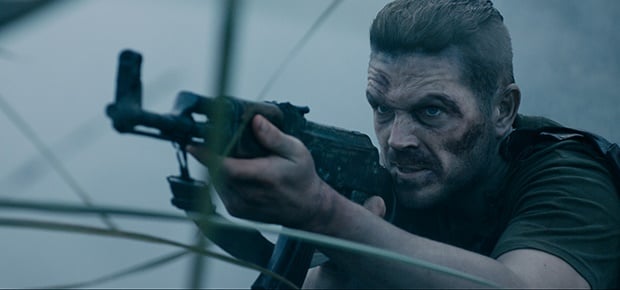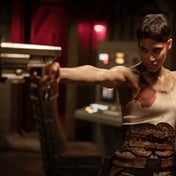
MOVIE:
The Recce
OUR RATING:
3/5 Stars
WHAT IT'S ABOUT:
After the SADF wrongly declares a young Recce dead behind enemy lines, it is up to him alone to use every skill and tool in his arsenal to make it back to his grieving wife. With the enemy hot on his trail, and a gunshot wound in his gut, Henk’s chances for survival are looking slim as he navigates the treacherous war torn African landscape.
WHAT WE THOUGHT:
The Border War left festering scars on the psyche of many South Africans, forced into it through conscription by a government that was ruthless in its sacrifice of young men. Many of us have family that survived the war grounds of Angola, but not much is talked about what happened in the bush, and the nightmares it left behind.
The Recce aims to break that silence, highlighting the trauma of the soldiers in the war, those who got out and the loved ones left behind. While its vision was commendable, the film lost itself in its own ponderings, gripping too loosely on the story for too long (this movie was even recut after a festival run because of length).
Henk Viljoen (Greg Kriek) is a recce that stays on in the military beyond his conscription duty, and is tasked with a secret assignment beyond the borders as his wife Nicola (Christia Visser) is pregnant with his child. He ends up being mistakenly labelled as Killed in Action (KIA) and abandoned by his superiors, fighting for survival with just the memory of home.
Firstly, the film is far from glorifying the Border War, and is a heavy attack on the Apartheid government’s callousness during it. There were a few veterans from the war at the cinematic premiere of The Recce, and they are definitely 100% on board with the portrayal, lending it at least authenticity. Beyond the localised war through, it’s also a portrayal of the general soldier’s plight that could be transplanted to any other war, and for that the film can transcend its genre as an Afrikaans drama.
That said though, the story was difficult to hang on to. Impi (played by Maurice Capede), a hitman at home that kills for his government without question, had the strangest story arc that made little sense in its relation to the main character Henk. He only entered the main story right at the end, with a side story popping up randomly in-between the main one. It created an intense disjointedness that’s difficult to overlook, and would have made more sense to introduce him much earlier so that he builds a better familiarity with the audience.
Henk’s isolation in the wild was understandable to start with, but after a while the lack of interaction through dialogue except with his tortured mind can be mind-numbingly boring. It’s a bit like a South African Blade runner sequel – beautifully filmed but the story became secondary to the art.
The acting cannot be faulted however, with my favourite performance coming from Albert Maritz, who plays Henk’s father distraught at losing his only son to what he perceives to be a futile war. Out of everyone’s grief his broken heart will break yours as well, although Visser also gives a great show of a grieving widow. Kriek however carries the film with a strong presence that is needed for such an intense role, but not even the most acclaimed actor could make the story component more compelling.
The issues I have with the film lies mostly with director and writer Ferdinand van Zyl, whose Terrence Malick-esque style is too domineering on the audience and can come off as obstinate and pretentious. But this is also a question of preference, as I am not a fan of that overly ethereal style of filmmaking. For me, a story needs to be the key foundation of a film, and that was severely lacking here.
From the ‘enemy’ side, you’re limited to the MIA soldier’s torturer and a caring child caught in the conflict. The torturer’s lack of name is apparently on purpose, conveying one of the many metaphors that populate the film, showing how humans were reduced to the ‘nameless enemy’. While many may feel like it’s making the other side of the war invisible, The Recce is again a large metaphor about how that was what was done during that time, and you still see the losses on both sides – not just physical but also emotional.
If you go into it willing to watch an essay on the psyche of soldiers and the trauma of war, then The Recce is the film for you, but if you’re looking for a captivating story you will find yourself bored by the director’s ethereal style. For those with Border survivors in the family, or if you yourself are one, I can give credit to the film’s authentic feel and poetic tribute to those whose memory will never be wiped out by the bush.
WATCH THE TRAILER HERE:




 Publications
Publications
 Partners
Partners











